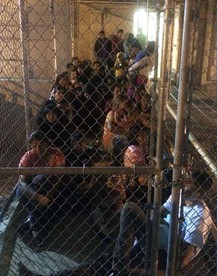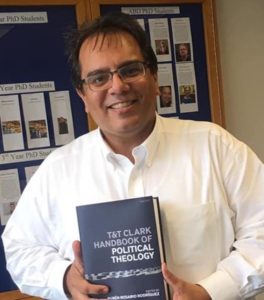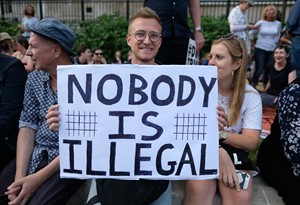Won’t Get Fooled Again? by Rubén Rosario Rodríguez
As a Christian concerned about issues of migration, dislocation, sanctuary status, and political asylum, I was glad to see the end of the Trump administration and its repressive border control policies. Still, as a critical realist I am reminded of these lines from the old song by the rock group The Who: “Meet the new boss, same as the old boss. Won’t get fooled again.” In other words, I never harbored any illusions about the Biden-Harris administration being much better on matters of immigration and refugee asylum.
The truth is, regardless of which political party is currently in power, national security and economic interests drive US foreign policy with humanitarian concerns low on the list of priorities. While pundits like Fox News’s Sean Hannity want us to focus on black and brown bodies at the border, a more intelligent view of the nation’s immigration policies begins with US involvement elsewhere in the Western hemisphere. How have US policies backing corrupt and authoritarian regimes contributed to the crisis along our Southern border? Take, for example, the current crisis in Texas and the Rio Grande, where thousands of Haitian refugees are being rounded up and deported by the Biden administration.
Sadly, while an argument can be made that Biden’s policies are more humane than under Trump, the fact remains Biden is following a longstanding pattern of US policy toward Haiti: “any migrants intercepted by the US Coast Guard off US shores will not be allowed to enter the country—they will be turned back or, if they express fear of returning to their home countries, repatriated to a third country.” The nation of Haiti has suffered one crisis after  another, beginning with President Jovenel Moïse’s July 2021 assassination, which led to increased gang violence, followed by a 7.2-magnitude earthquake and a tropical storm that left over 2,200 dead and many thousands more injured, missing, or homeless. This perfect storm of human and natural evils drove thousands of Haitians to make the dangerous journey by sea to the US southern border, nearly six times the number of Haitian refugees in the US—over 30,000—than the previous fiscal year. From a humanitarian perspective, the Biden administration added insult to injury by invoking Trump era pandemic-related border policies (known as Title 42) to rapidly expel over a million migrants without due process of law (receiving a hearing before an immigration judge). Vice President Kamala Harris recently announced a five-point US policy targeting “illegal” immigration at the border that addresses economic insecurity and inequality in various countries of origin while promising to combat political corruption and promote respect for human rights. Nevertheless, the fact remains both Biden and Harris campaigned as “law and order” candidates who are tough on crime. Don’t expect much to change so long as they continue to criminalize immigration.
another, beginning with President Jovenel Moïse’s July 2021 assassination, which led to increased gang violence, followed by a 7.2-magnitude earthquake and a tropical storm that left over 2,200 dead and many thousands more injured, missing, or homeless. This perfect storm of human and natural evils drove thousands of Haitians to make the dangerous journey by sea to the US southern border, nearly six times the number of Haitian refugees in the US—over 30,000—than the previous fiscal year. From a humanitarian perspective, the Biden administration added insult to injury by invoking Trump era pandemic-related border policies (known as Title 42) to rapidly expel over a million migrants without due process of law (receiving a hearing before an immigration judge). Vice President Kamala Harris recently announced a five-point US policy targeting “illegal” immigration at the border that addresses economic insecurity and inequality in various countries of origin while promising to combat political corruption and promote respect for human rights. Nevertheless, the fact remains both Biden and Harris campaigned as “law and order” candidates who are tough on crime. Don’t expect much to change so long as they continue to criminalize immigration.
The Parable of the Good Samaritan can inform a Christian response to the current migrant crisis, but in order to understand the parable it is vital to know something of the social context of Galilee in the first century to understand the impact Jesus’s parable had on a Jewish audience. In the story a priest and a Levite walk past an injured man on the side of the road, while the Samaritan—a member of a despised ethnic and religious minority group—lends assistance (Luke 10:25–37). That is, the two expected to know and act according to the Word of God think only of their own well-being, while the one who would have been viewed by Jesus’s audience as morally suspect (the Samaritan) is the only one who embodies divine love and compassion. In the words of Latin American liberation theologian, Gustavo Gutiérrez, “The neighbor was the Samaritan who approached the wounded man and made him his neighbor. The neighbor, as has been said, is not the one whom I find in my path, but rather the one in whose path I place myself, the one whom I approach and actively seek” (A Theology of Liberation, 113).
There are Christian voices calling for a humane and compassionate US foreign policy on immigration. In 2012, the 220th General Assembly of the Presbyterian Church (USA) called for comprehensive immigration reform; the United States Conference of Catholic Bishops issued a “Statement Regarding Their Deep Concern About Restricting Access to Asylum” (2018); the Episcopal Church in the US published a statement on “Advocating for Refugee Protection and Resettlement” (2018) and recently commented on the Biden administration’s follow-through on their promise to raise refugee caps; even Pope Francis reminded US Catholics in 2020 that, “Immigrants, if they are helped to  integrate, are a blessing, a source of enrichment and new gift that encourages a society to grow.” Unfortunately, so long as Christian voices are more concerned about political expediency, economic gain, and national security, humanitarian concerns will always lose out. If George W. Bush was unable to gain support from the Republican nativist base for his comprehensive immigration reform proposal in 2007, it is highly unlikely President Biden will establish a bipartisan coalition to pass immigration reform in 2021.
integrate, are a blessing, a source of enrichment and new gift that encourages a society to grow.” Unfortunately, so long as Christian voices are more concerned about political expediency, economic gain, and national security, humanitarian concerns will always lose out. If George W. Bush was unable to gain support from the Republican nativist base for his comprehensive immigration reform proposal in 2007, it is highly unlikely President Biden will establish a bipartisan coalition to pass immigration reform in 2021.
In 2016 candidate Trump made a series of disparaging and racist remarks about Latino/a people in the US, calling them rapists, animals, and “bad hombres.” As president, he enforced a series of policies that further dehumanized Latino/as by criminalizing them through all manner of legal and judicial means. To draw attention away from personal political scandals, Trump then used the media to fabricate an immigration crisis, even deploying the US military to stop a supposed tidal wave of undocumented immigrants overwhelming our southern border. His zero-tolerance border enforcement policies created holding facilities that are de facto concentration camps, squandered innocent lives, separated children from their parents, and subjected the most vulnerable detainees (women and children) to physical and sexual abuse at the hands of their jailers. It is unfortunate that the Biden administration inherited this humanitarian crisis, and while Biden rolled back some of the Trump-era immigration policies, he has strategically employed others (Title 42) for political gain.
Politicians continue to act with impunity because we—the voting citizens of this country—do not hold them accountable. Many Christians justify their political passivity by citing the apostle Paul’s exhortation in defense of the state, “Let every person be subject to the governing authorities” (Romans 13:1, NRSV). I prefer to side with the apostle Peter who said, “We must obey God rather than any human authority” (Acts 5:29, NRSV). When Jesus commands me to love my neighbor as myself (Mark 12:32), then cautions, “Truly I tell you, just as you did not do it to one of the least of these, you did not do it to me” (Matthew 25:45, NRSV), I would rather err on the side of compassion for the alien in our midst (Exodus 22:21).
N.B. Image inside a Sector Border Patrol Processing Station in the Rio Grande Valley made available by and courtesy of the Office of U.S. Representative Henry Cuellar. Image of anti-Trump protesters in the UK carrying a “Nobody Is Illegal!” sign is made available under the Creative Commons Attribution-Share Alike 2.0 Generic license. The photo was taken by: Alisdare Hickson from Canterbury, United Kingdom.
 The Rev. Dr. Rubén Rosario Rodríguez, a graduate of both Union Theological Seminary in New York and Princeton Theological Seminary, is a Professor of Systematic Theology in the Department of Theological Studies at Saint Louis University. His work bridges systematic/constructive theology, theological ethics, and political theology, and he is currently working on a monograph entitled Theological Fragments for a Fractured World (forthcoming from Westminster John Knox Press). He is the author of Racism and God Talk: A Latino/a Perspective (New York University Press, 2008), Christian Martyrdom and Political Violence: A Comparative Theology with Judaism and Islam (Cambridge University Press, 2017), Dogmatics After Babel: Beyond the Theologies of Word and Culture, and editor of the T&T Clark Handbook of Political Theology (Bloomsbury/T&T Clark, 2019).
The Rev. Dr. Rubén Rosario Rodríguez, a graduate of both Union Theological Seminary in New York and Princeton Theological Seminary, is a Professor of Systematic Theology in the Department of Theological Studies at Saint Louis University. His work bridges systematic/constructive theology, theological ethics, and political theology, and he is currently working on a monograph entitled Theological Fragments for a Fractured World (forthcoming from Westminster John Knox Press). He is the author of Racism and God Talk: A Latino/a Perspective (New York University Press, 2008), Christian Martyrdom and Political Violence: A Comparative Theology with Judaism and Islam (Cambridge University Press, 2017), Dogmatics After Babel: Beyond the Theologies of Word and Culture, and editor of the T&T Clark Handbook of Political Theology (Bloomsbury/T&T Clark, 2019).

